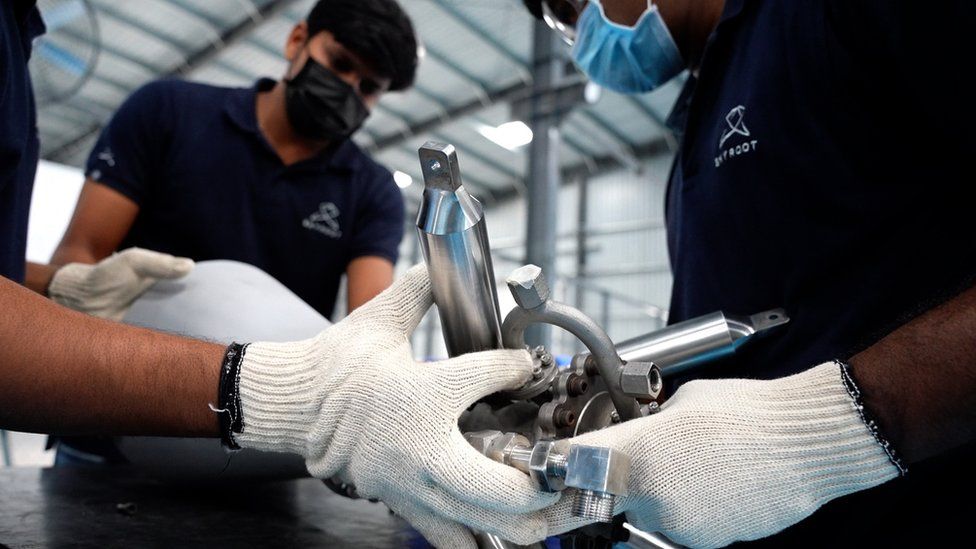“We started with a leap of faith.”
That’s what Naga Bharath Daka says when asked about Skyroot Aerospace, the Indian space-tech start-up he co-founded with a colleague in 2018.
Inspired by the promise offered by the space sector, he and fellow engineer Pawan Chandana left their secure government jobs at the Indian Space Research Organization (ISRO) – the country’s government-run space agency – to set up Skyroot, which builds rocket components to send satellites into space.
On Friday, Skyroot created history by launching India’s first privately developed rocket from ISRO’s Sriharikota space centre in eastern India.
The BBC is not responsible for the content of external sites.View original tweet on Twitter
It’s an exciting time to be part of India’s space industry, which has often been credited for pulling off ambitious missions on relatively low budgets.
India’s funding for space research is just a fraction of what the US and China spend.
It claims only around 2% of the global space market share, but experts hope the ongoing reforms can help boost the sector further.
India opened the space sector for private firms in 2020 and allowed them to build rockets and satellites. They have also been allowed to use ISRO’s launching facilities.
“India deserves to have a bigger share of the global space economy. We should be looking at at least 8-10%” says businessman Pawan Goenka, who heads INSPACe, a centre set up by the government to coordinate between private space firms and ISRO.

According to government estimates, the Indian space industry was worth around $7bn in 2019 but has the potential of growing to $50bn by 2024.
Skyroot was the first start-up to sign up with ISRO after the government allowed private firms. Since then, almost 100 start-ups have joined it.
In September, Skyroot raised a record $51m (£42.9m) in a series-B funding round – the largest ever in the Indian space-tech sector.
Around 10 other private firms have also either launched or are close to launching their products. A start-up called Pixxel is working on a product which will help provide images that can help in mining and disaster management. Digantara, a Bengaluru-based start-up, is mapping space debris for the world. Other companies such as Dhruva, Agnikul and Bellatrix are also trying to make their mark.
The flourishing of space start-ups has also given more opportunities to young Indians to work in the country instead of going abroad to achieve their dreams.
“It has now become more accessible for aerospace engineers to have more scope in India,” says Himani Varshney, 25, an engineer who works at Skyroot.

Experts say that over the years, ISRO has built up a reputation as a cost-effective and reliable partner. Apart from launching its own research-oriented space missions, ISRO has partnered with more than 30 countries to help launch nearly 400 of their satellites.
Mr Goenka says India can aim even higher by building rockets and satellites at low costs for other countries.
“Right now, all things built in India are for consumption within India. Building for other countries can be a fairly big business for India,” he says.
The war in Ukraine has also triggered more opportunities for India. London-based satellite company OneWeb – which is financially backed by Indian tech giant Bharti Airtel – turned to India after it was forced to suspend use of Russian rockets due to sanctions on Moscow.
In October, ISRO launched 36 satellites for OneWeb on an LVM3 rocket, taking the number of satellites it has in space to 462. OneWeb had planned to send a total of 648 satellites into space and with Russia out of the picture, India is now stepping up to launch the rest as well.
“It’s a blessing in disguise for India, in the sense that we had to look at what are the best opportunities for us. I think that vacuum [of Russia] has been addressed amply by the capabilities of ISRO and India,” said Rahul Vatts, an India-based director of OneWeb.

“It’s a wonderful opportunity for India. Once you say you will launch 30-40 satellites, the world market starts looking towards you in a different way,” Mr Vatts adds.
But there are challenges for private companies that aspire to make it big in the sector.
Companies can’t expect to make profits overnight, says Lt Gen AK Bhatt, director general of the Indian Space Association, a space policy advocacy unit which works closely with the government.
“It’s a long business – from the time you plan to launch a rocket, design a rocket, design a satellite, and then launch it, then find a market and then have the outcomes in terms of returns. So many businessmen would only come in when the money starts coming in,” he says.
Mr Goenka adds that it is not “an easy sector”.
“It will require a lot of hard work for several years before we can truly see its fruits”.
Source : BBCNews
